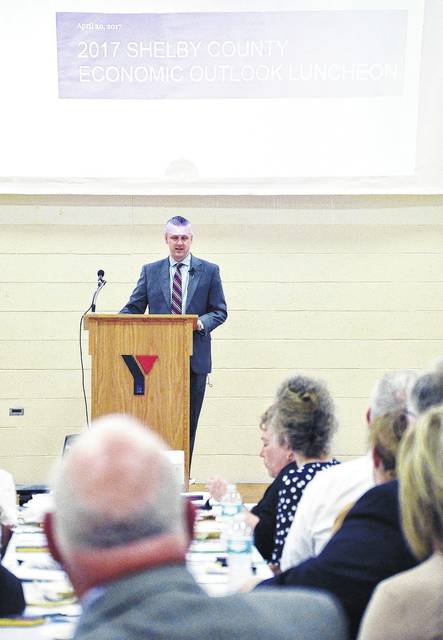
SIDNEY — The economic future for Shelby County is positive.
So said Michael Shebak, senior managing director and head of institutional consulting at Hartland, a Cleveland-based investment firm, Thursday, April 20, during the Economic Outlook Luncheon in the Sidney-Shelby County YMCA.
He addressed 270 of the county’s top business, government, social service and educational leaders at the event, which was sponsored by the YMCA, the Community Foundation of Shelby County and the Sidney-Shelby County Chamber of Commerce.
“Shelby County, unlike many cities and counties, has historically found a way to survive and thrive. Given that, I don’t see why Shelby County won’t continue to do that,” he said.
He is familiar with Shelby County commerce because he advises Wilson Health, which is a Hartland client. Manufacturing, agriculture and health care are what drives the local economy, he noted. Shebak waxed philosophical before digging into details.
“None of us likes change, but without it, nothing progresses,” he said. “Those who anticipate change and accept it will do well.”
According to Shebak, it will be trade, tax and regulation/deregulation policies that drive the changes.
“We think deregulation is to have the biggest impact,” he said. “Deregulation will help everybody. It makes it easier to operate. It’s difficult and expensive for a small business to comply.”
The impact will be felt more in the manufacturing and agriculture sectors that the health care sector, he added.
“On the other hand, rules are there to keep us out of trouble. In 2006, 2007, 2008, lax regulatons led us into a little bit of a problem,” he admitted. But then he likened regulating to a college football game.
“Let’s pretend that every time Jim Harbaugh complained about a call, the NCAA put another official on the field. Soon it would be only officials and play calls. We’d have gridlock,” he said. “With regulation, typically, the less rules the better.”
Shebak thinks the government is considering tax cuts to influence consumer and corporate behaviors.
“We’re a consumer-driven economy in the U.S.,” he said. Paying less money in taxes would permit people and businesses to spend more. Corporate tax cuts would affect manufacturing most. They would reduce the tax burden and increase income for businesses, allowing those businesses to invest in their equipment, research and development and “maybe even hire some more people,” he said. An idea much bandied about in Washington, D.C., to establish an border tax would make a difference, too, but not necessarily a positive one.
“Trump wants to balance U.S. imports and exports across the whole economy. He’d make up for the loss in the tax cut with the border tax,” Shebak said. “The impact of trade reform will affect agriculture differently from manufacturing.”
He explained that companies that make, for instance, widgets now may start the pieces in the U.S. and then ship them to Mexico, where they are worked on or added to, then shipped back to the U.S. for another part of the process. The back-and-forth can be multiple times. As the tax code is written now, the widget is taxed once, when it’s done. A border tax would add a tax to it each time it crosses the border.
“Ultimately, that tax is passed through to the consumer,” Shebak said.
In terms of agriculture, the U.S. has a trade surplus instead of the deficit it has with manufactured goods.
“The U.S. exports $18 billion annually to Mexico, mostly in corn and soybeans. The talk of an import tax with Mexico leads to nervousness in Mexico. They’re looking to other trading partners,” he noted.
In looking at the global economy, Shebak said there is growth, although it is slow. He called it consistent, moderate and positive.
He outlined two scenarios for Shelby County.
“It’s not easy these days in Washington to make changes. There’s a lot of gridlock, so growth is slow. But if the changes take hold and we see a big reinvestment, we would see a shift from monetary policy to fiscal policy,” he said.
Shebak had opened his presentation by noting that Shelby County has 50,000 residents and a labor force numbering 25,000. The unemployment rate and median incomes are very near the national average. In Shelby County they are 4.6 percent and $51,159, respectively.
Shelby County, with 33 percent of its employment in manufacturing, has the highest percentage of manufacturing jobs per capita in the state. There are roughly 1,000 farms comprising 287,000 acres here generating cah receipts of $208 million annually. That puts Shelby County in the top 10 percent of counties in the state in agriculture. As for health care, Wilson Health is the third largest employer in the county, after Honda and Emerson Climate Technologies.
He addressed questions from attendees concerning the national debt, the housing market, timing on passage of Trump’s policy proposals, a universal basic income and infrastructure investment.
YMCA Board of Trustees President Will Balling opened the event with welcome remarks. Josh Koltak, chairman of the Chamber of Commerce board and Mardi Milligan, chairwoman of the Community Foundation board, also presented overviews of their organizations.


